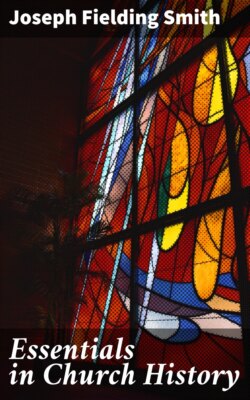Читать книгу Essentials in Church History - Joseph Fielding Smith - Страница 66
На сайте Литреса книга снята с продажи.
Patriotic Service of Samuel Smith
ОглавлениеTable of Contents
Samuel, son of Robert and Mary, was born January 26, 1666. He married Rebecca, daughter of John Curtis, a prominent citizen of the town of Topsfield. After his father’s death, Samuel moved to Topsfield, where he became an influential member of that community and was honored by the citizens with several offices of trust. He was the father of nine children. His son Samuel, born January 26, 1714, was one of the most prominent citizens of Topsfield. The greater part of his life was spent in the service of the people. He passed through the stormy days of the American Revolution and bore arms in defense of the liberties of the people. Among the many positions he held are the following: He was grand juryman in 1760; in 1770, road supervisor; in 1779, 1780, 1783, 1784 and 1785, on the committee of safety; from 1771 to 1777 and in 1781 and 1782, assessor and selectman in Topsfield, declining the honor in 1783; he was moderator, in 1758–60, 1762, 1764, 1766–73, 1777–80, and 1782–83; representative to the General Court (House of Representatives) in 1764–70, 1772, 1777–78, and 1781; town clerk in 1774, 1776 and 1777; delegate to the Provincial Congress at Concord, October 11, 1774 and again January 19, 1775, and on the tea committee, from Topsfield and acted as chairman, in 1773.
He was known as Captain Samuel Smith, receiving his military title during service in the militia of Massachusetts. He married Priscilla, daughter of Zacheus Gould of Topsfield. They had five children, two sons and three daughters. The mother died shortly after the birth of her youngest child, and Samuel married a cousin of his first wife who bore the same name. He died November 22, 1785, leaving an estate valued at more than 544 pounds sterling. The Salem Gazette of November 22, 1785, made mention of him in the following words:
“Died.—At Topsfield, on Monday, the 14th instant, Samuel Smith, Esq. So amiable and worthy a character as he evidently appeared, both in public and private, will render the memory of him ever precious. For a number of years he represented the town in the General Court, where he was esteemed a man of integrity and uprightness. His usefulness among those with whom he was more immediately conversant was eminent. He was a sincere friend to the liberties of his country, and a strenuous advocate for the doctrine of Christianity.”
“The memory of the Just be blessed.”
